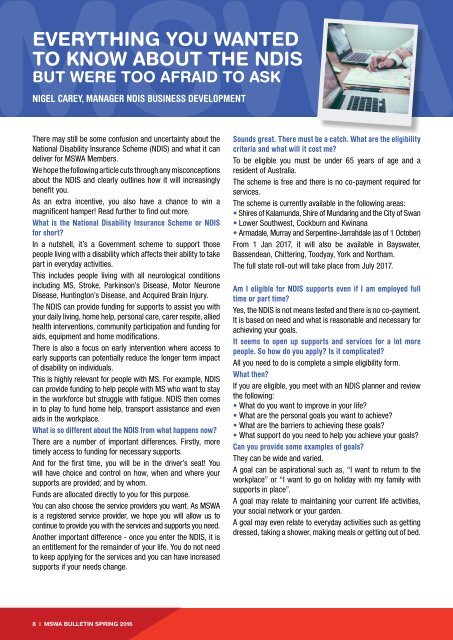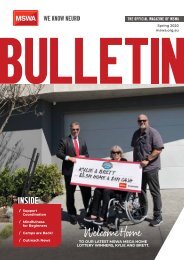You also want an ePaper? Increase the reach of your titles
YUMPU automatically turns print PDFs into web optimized ePapers that Google loves.
EVERYTHING YOU WANTED<br />
TO KNOW ABOUT THE NDIS<br />
BUT WERE TOO AFRAID TO ASK<br />
NIGEL CAREY, MANAGER NDIS BUSINESS DEVELOPMENT<br />
There may still be some confusion and uncertainty about the<br />
National Disability Insurance Scheme (NDIS) and what it can<br />
deliver for <strong>MSWA</strong> Members.<br />
We hope the following article cuts through any misconceptions<br />
about the NDIS and clearly outlines how it will increasingly<br />
benefit you.<br />
As an extra incentive, you also have a chance to win a<br />
magnificent hamper! Read further to find out more.<br />
What is the National Disability Insurance Scheme or NDIS<br />
for short?<br />
In a nutshell, it’s a Government scheme to support those<br />
people living with a disability which affects their ability to take<br />
part in everyday activities.<br />
This includes people living with all neurological conditions<br />
including MS, Stroke, Parkinson’s Disease, Motor Neurone<br />
Disease, Huntington’s Disease, and Acquired Brain Injury.<br />
The NDIS can provide funding for supports to assist you with<br />
your daily living, home help, personal care, carer respite, allied<br />
health interventions, community participation and funding for<br />
aids, equipment and home modifications.<br />
There is also a focus on early intervention where access to<br />
early supports can potentially reduce the longer term impact<br />
of disability on individuals.<br />
This is highly relevant for people with MS. For example, NDIS<br />
can provide funding to help people with MS who want to stay<br />
in the workforce but struggle with fatigue. NDIS then comes<br />
in to play to fund home help, transport assistance and even<br />
aids in the workplace.<br />
What is so different about the NDIS from what happens now?<br />
There are a number of important differences. Firstly, more<br />
timely access to funding for necessary supports.<br />
And for the first time, you will be in the driver’s seat! You<br />
will have choice and control on how, when and where your<br />
supports are provided; and by whom.<br />
Funds are allocated directly to you for this purpose.<br />
You can also choose the service providers you want. As <strong>MSWA</strong><br />
is a registered service provider, we hope you will allow us to<br />
continue to provide you with the services and supports you need.<br />
Another important difference - once you enter the NDIS, it is<br />
an entitlement for the remainder of your life. You do not need<br />
to keep applying for the services and you can have increased<br />
supports if your needs change.<br />
Sounds great. There must be a catch. What are the eligibility<br />
criteria and what will it cost me?<br />
To be eligible you must be under 65 years of age and a<br />
resident of Australia.<br />
The scheme is free and there is no co-payment required for<br />
services.<br />
The scheme is currently available in the following areas:<br />
• Shires of Kalamunda, Shire of Mundaring and the City of Swan<br />
• Lower Southwest, Cockburn and Kwinana<br />
• Armadale, Murray and Serpentine-Jarrahdale (as of 1 October)<br />
From 1 Jan 2017, it will also be available in Bayswater,<br />
Bassendean, Chittering, Toodyay, York and Northam.<br />
The full state roll-out will take place from July 2017.<br />
Am I eligible for NDIS supports even if I am employed full<br />
time or part time?<br />
Yes, the NDIS is not means tested and there is no co-payment.<br />
It is based on need and what is reasonable and necessary for<br />
achieving your goals.<br />
It seems to open up supports and services for a lot more<br />
people. So how do you apply? Is it complicated?<br />
All you need to do is complete a simple eligibility form.<br />
What then?<br />
If you are eligible, you meet with an NDIS planner and review<br />
the following:<br />
• What do you want to improve in your life?<br />
• What are the personal goals you want to achieve?<br />
• What are the barriers to achieving these goals?<br />
• What support do you need to help you achieve your goals?<br />
Can you provide some examples of goals?<br />
They can be wide and varied.<br />
A goal can be aspirational such as, “I want to return to the<br />
workplace” or “I want to go on holiday with my family with<br />
supports in place”.<br />
A goal may relate to maintaining your current life activities,<br />
your social network or your garden.<br />
A goal may even relate to everyday activities such as getting<br />
dressed, taking a shower, making meals or getting out of bed.<br />
8 | <strong>MSWA</strong> BULLETIN SPRING 20<strong>16</strong>


















